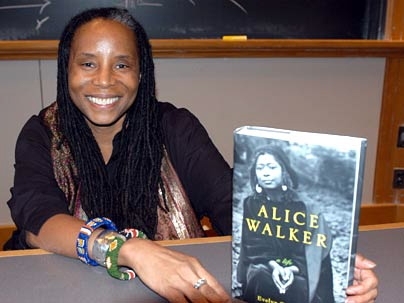"Alice Walker: A Life" was a labor of love for long-time journalist and biographer Evelyn White, who came to MIT on March 10 to discuss her process and the book itself with Associate Writing Professor Helen Lee.
White's visit was part of the Committee on Campus Race Relation's week of events and programs highlighting issues of race and diversity.
White said she first came to know of author Alice Walker in 1985 when the film version of Walker's Pulitzer Prize-winning novel, "The Color Purple," was released. Walker was the first African-American woman to win the prize for fiction.
Despite her success, Walker came under fire from critics who said her book, and later the movie version of the novel, perpetuated a negative stereotype of men. White said she admired Walker's vision and ability to stay strong through the maelstrom.
"I was very interested in what it was about her work that drew criticism from so many corners," said White.
Over time, she became convinced that the best way to defend Walker was to remind people of her roots growing up as the daughter of a sharecropper in Jim Crow South. "People had forgotten," White said.
White got to know the author after Walker wrote her a letter to say she'd enjoyed a review White wrote of one of her books. "We became collegial allies," White said.
Initially, Walker did not like the idea of a biography, but one year after White first approached her, Walker offered her carte blanche into her past.
As the book, scheduled to take four years, crept past deadline, it was Walker who kept White sane, she said. At first daunted by the prospect of containing such a life on the pages of a novel, White found her direction driving home one night. She was inspired to write the book as though she were introducing Walker to playwright and "Raisin in the Sun" author Lorraine Hansberry, who died in 1965.
Through Walker's files, countless interviews with Walker herself, her family members, friends and associates, White painstakingly brought the book together. And then, "finally one day in 2003, the voice said, 'she knows enough.'" With that, the process was complete. It had taken White 10 years.
For White, the opportunity to write about someone who opened so many doors and broke so many barriers has been amazing.
"There is no doubt about it, I admire Alice Walker," she said. "Alice has been a visionary, and it takes people a while to catch up with her."
The White talk was one of 10 events that took place during the first CCRR Week from March 5-12. Other events included "Black Boy," a one-man performance based on Richard Wright's 1945 autobiography and "��Yo Soy Latina!" a play exploring life as a Latina in the United States.
There were also lectures, discussions and film screenings all centered on issues related to race and ethnicity.
A version of this article appeared in MIT Tech Talk on March 16, 2005 (download PDF).






